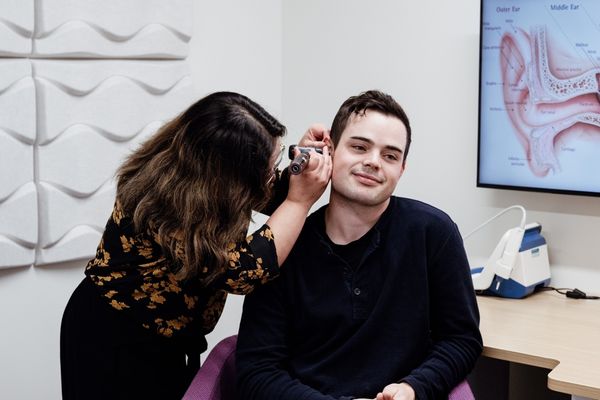Pulsatile Tinnitus

Pulsatile Tinnitus
14 Minutes
Published 30 June 2021
Pulsatile Tinnitus is a rare condition, brought on by constricted blood flow in and around the ears. While pulsatile tinnitus usually is not anything to worry about, the condition may be a sign of an underlying health complication. When in doubt, speak to your audiologist if you are unsure of what is causing your symptoms.
Symptoms
While tinnitus consists of hissing, rushing or roaring sounds, with pulsatile tinnitus, the sounds come in time to the rhythm of your heartbeat. Most people experience pulsatile tinnitus in just one ear, but it can occur in both.- Thumping or throbbing sounds that beat in time with your own heartbeat (an effect of the blood circulating around your body)
- Whooshing
- Grinding
- Hissing
- Whistling
- Ringing in your ears
Causes
While standard tinnitus usually has no identifiable cause, it is more likely that there will be an underlying cause behind pulsatile tinnitus. Many cases are caused by a change in the flow of blood through the vessels in and around your ear, or a change in your awareness.
This change can happen for a number of reasons, including:
- An increase in the blood flow around your body (a result of pregnancy, exercise, medications or anaemia)
- Irregularly shaped blood vessels – usually encouraging your blood to flow faster, which makes more noise than slow-flowing blood
- Artery blockages; Atherosclerosis is a condition that cases fatty deposits to clog arteries and limits blood flowing freely through them
- Blocked ears making internal sounds amplified, such as perforated eardrum or impacted earwax
- High blood pressure
- Hyperthyroidism – an overactive thyroid gland
If you do notice any signs of symptoms indicating pulsatile tinnitus, speak to your doctor as soon as possible. They will be able to examine you and confirm a diagnosis.
Diagnosis
It is important that any symptoms are assessed by your audiologist. They will carry out an initial review of your symptoms and medical history and will examine your ears and neck to check how well your blood is circulating.
They may also arrange additional tests to determine the exact nature of your condition. These may include:
- A hearing check
- Blood test
- MRI
- CT scan
- Angiogram (to review how well your blood vessels are functioning)
- Ultrasound
Your doctor or trained audiologist may refer you to an ear, nose and throat specialist (ENT) to investigate potential causes.
Treatment
In most cases, treatment comes by addressing the underlying cause. For instance, if it is brought on by high blood pressure or a condition involving a vein or artery, pulsatile tinnitus can be treated with a combination of medication and lifestyle changes. These can include:
- Regular exercise
- Quitting smoking
- Stress reduction
- Switching to a low-sodium diet
- Sound therapy
- Cognitive Behavioural Therapy (CBT)
- Tinnitus Retraining Therapy (TRT)
- Relaxation exercises
- Mindfulness techniques
- Counselling
Video: Your Pulsatile Tinnitus Questions, Answered
Frequently asked questions
Is pulsatile tinnitus dangerous?
Pulsatile tinnitus itself is not usually dangerous, although for some sufferers, symptoms can prove annoying. A medical or hearing healthcare professional will advise on effective treatments for keeping these at bay.
Does pulsatile tinnitus go away on its own?
Whilst it can disappear, it will be an a case-by-case basis and entirely depend on the individual and underlying cause. Common occurrences, such as during exercise when blood pressure increases, tend to abate once the body regulates itself.
Is there a link between pulsatile tinnitus and anxiety?
Though there’s no evidence to say that tinnitus is caused by stress, it can make existing tinnitus worse. New research has suggested a link between anxiety and pulsatile tinnitus, particularly after a period of significant stress.
If this is the case, you may notice symptoms flare up while you’re under a lot of stress. Remember to take good care of your mental health as well as your physical wellbeing; it could go a long way in easing the impact of pulsatile tinnitus on your day-to-day life.
Is pulsatile tinnitus permanent?
Unless there’s an underlying cause that can be treated, or it has come on as a result of something like strenuous exercise, pulsatile tinnitus is usually permanent. It rarely goes away by itself, but this varies on a case-by-case basis.
However, there are ways to manage the condition, with many sufferers finding that sound therapy, relaxation therapy or Cognitive Behavioural Therapy (CBT) (among others) can help relieve their symptoms.
Can pulsatile tinnitus be cured?
Providing there’s an underlying cause to your pulsatile tinnitus, and treatment for that cause is effective, pulsatile tinnitus can be cured as the cause is cured.
There are instances where no cause can be found, and treatment then moves onto managing the condition, rather than curing it. There are many ways to do this, including Tinnitus Retraining Therapy (TRT), mindfulness and sound therapy.
Is pulsatile tinnitus hereditary?
Thanks to recent research, there’s evidence to suggest that some forms of tinnitus can run in families, and that you can be genetically predisposed to develop it. However, there’s still strong evidence that environmental factors play a part too.
Can be pulsatile tinnitus intermittent?
Yes. The noises associated with pulsatile tinnitus - such as throbbing, whistling, and ringing - aren’t always constant, and can come and go.
This is particularly the case if the condition is brought on by exercise as the symptoms should ease as your blood pressure returns to normal.
Pulsatile tinnitus is usually not a cause for concern; however, some cases can point to potentially serious health conditions, so it’s vital you get checked out by your GP or a trained audiologist as soon as possible.







